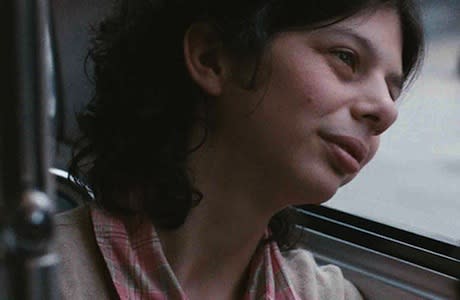Louise Archambault's Gabrielle is a respectful, honest and moving story about love, music and personal independence. It also happens to be about the developmentally challenged. Specifically, the titular Gabrielle is a young woman who came up short a few (about 25) genes in the genetic lottery. This bit of cosmic chance is known as Williams Syndrome.
To create a realistic portrait of a woman with this condition and how she connects to life through sound, Archambault cast Gabrielle Marion-Rivard, an utterly enthralling onscreen presence and actual sufferer of this rare neurological disorder.
Determined to show the unfiltered emotions of this unique woman, the director, who also wrote the script, judiciously employs the elegant camerawork of Mathieu Laverdiere — intimate when his subject is submerged in thought or deep feeling, while pulling back to capture the joyous sense of inclusiveness she feels as part of a choir of fellow developmentally challenged persons of varying degree of functionality.
She undoubtedly loves music, but there's something more to the glee she vibrates with at practice. That something is Martin, the choir's star vocalist. Holding down a job at the pet store, but still living with his mother, Martin (Alexandre Landry) is marginally more self-sufficient than Gabrielle, who lives in a group home and has the regular support of her sister (Melissa Desormeaux-Poulin).
Early scenes of the choir rehearsing for an upcoming festival appearance as the back-up singers for famous French-Canadian vocalist Robert Charlebois (fittingly, his signature tune is "Ordinary Guy") affectionately depict two delightful young adults entirely incapable of guile fanning the tentative sparks of romantic love.
Gabrielle and Martin are so adorable together that you'll be hoping Gabrielle's sister's decision to move to India to be with her partner is the extent of the hardship the disarming duo will face. But, of course, lessons of the heart cannot be learned without pain, so another dramatic shoe drops when Martin's mother forbids the young couple from continuing their courtship after they're busted for getting their grope on at a recreation centre dance.
Her restrictive coddling feels like the most irrational of disruptive betrayals. Don't forget though: some people are narrow-minded, insecure, puritanical bigots. Sometimes people just don't know how to deal with what they don't understand, especially parents. That also seems to be the case with Gabrielle's mother, who has a very hands-off approach to parenting, which is the polar opposite of the loving relationship between her extremely close daughters.
Driven forward by the ticking clock of the approaching concert date, the film compassionately follows Gabrielle's struggle to expand and understand the limitations of her independence. Through it all, Archambault captures the frustration and beauty of wanting nothing more or less than the right to listen to one's biological instincts.
Even though its ending feels a bit abrupt, leaving a number of issues unresolved, and the exploration of the universal language of sound falls by the wayside, to a certain degree, when romantic distress enters the fray, Gabrielle is an absolute joy and a maturely considered treatment of subject matter often rendered impotent by preachy or precious handling.
(eOne)To create a realistic portrait of a woman with this condition and how she connects to life through sound, Archambault cast Gabrielle Marion-Rivard, an utterly enthralling onscreen presence and actual sufferer of this rare neurological disorder.
Determined to show the unfiltered emotions of this unique woman, the director, who also wrote the script, judiciously employs the elegant camerawork of Mathieu Laverdiere — intimate when his subject is submerged in thought or deep feeling, while pulling back to capture the joyous sense of inclusiveness she feels as part of a choir of fellow developmentally challenged persons of varying degree of functionality.
She undoubtedly loves music, but there's something more to the glee she vibrates with at practice. That something is Martin, the choir's star vocalist. Holding down a job at the pet store, but still living with his mother, Martin (Alexandre Landry) is marginally more self-sufficient than Gabrielle, who lives in a group home and has the regular support of her sister (Melissa Desormeaux-Poulin).
Early scenes of the choir rehearsing for an upcoming festival appearance as the back-up singers for famous French-Canadian vocalist Robert Charlebois (fittingly, his signature tune is "Ordinary Guy") affectionately depict two delightful young adults entirely incapable of guile fanning the tentative sparks of romantic love.
Gabrielle and Martin are so adorable together that you'll be hoping Gabrielle's sister's decision to move to India to be with her partner is the extent of the hardship the disarming duo will face. But, of course, lessons of the heart cannot be learned without pain, so another dramatic shoe drops when Martin's mother forbids the young couple from continuing their courtship after they're busted for getting their grope on at a recreation centre dance.
Her restrictive coddling feels like the most irrational of disruptive betrayals. Don't forget though: some people are narrow-minded, insecure, puritanical bigots. Sometimes people just don't know how to deal with what they don't understand, especially parents. That also seems to be the case with Gabrielle's mother, who has a very hands-off approach to parenting, which is the polar opposite of the loving relationship between her extremely close daughters.
Driven forward by the ticking clock of the approaching concert date, the film compassionately follows Gabrielle's struggle to expand and understand the limitations of her independence. Through it all, Archambault captures the frustration and beauty of wanting nothing more or less than the right to listen to one's biological instincts.
Even though its ending feels a bit abrupt, leaving a number of issues unresolved, and the exploration of the universal language of sound falls by the wayside, to a certain degree, when romantic distress enters the fray, Gabrielle is an absolute joy and a maturely considered treatment of subject matter often rendered impotent by preachy or precious handling.
